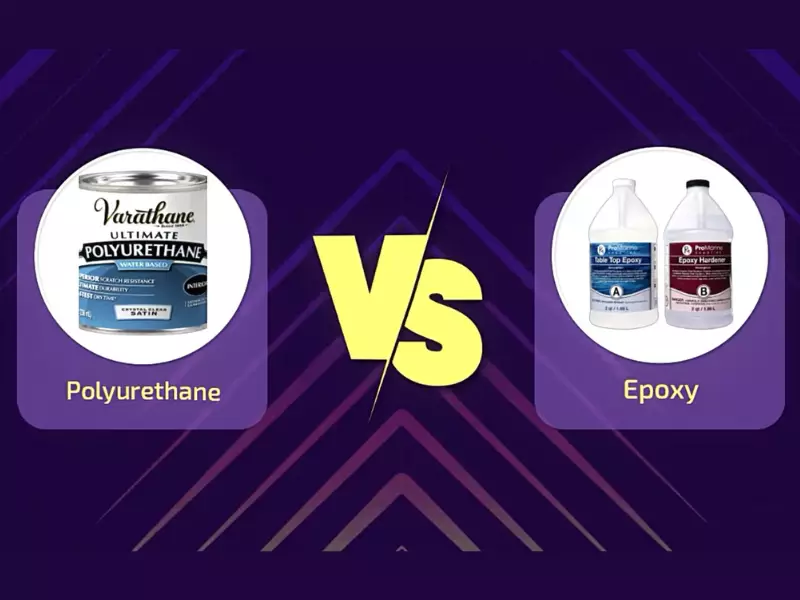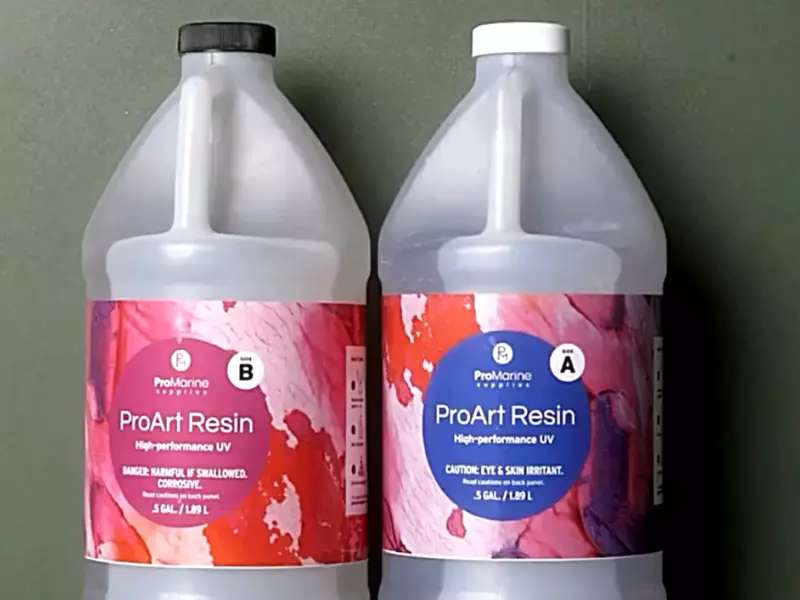When it comes to selecting the right materials for both industrial and DIY projects, the choice often narrows down to two formidable contenders: epoxy and polyurethane. Both substances are renowned for their adhesive qualities and protective finishes, making them staples in the realms of construction, manufacturing, and craft projects. Despite their common applications, epoxy and polyurethane possess distinct characteristics that cater to varied project requirements.
Epoxy is a thermosetting polymer known for its superior strength, excellent adhesion, and chemical resistance, making it ideal for heavy-duty applications where durability is paramount. Polyurethane, on the other hand, is celebrated for its flexibility, abrasion resistance, and capacity to withstand environmental elements, including UV light and moisture. Choosing between these materials hinges on understanding their unique properties, application techniques, and performance in different environments.
The distinction between epoxy and polyurethane extends beyond their basic chemical composition to include differences in physical properties, application processes, aesthetics, and overall performance. Epoxy is typically preferred for its hard, durable finish and strong bonding capabilities, while polyurethane is favored for its flexibility and resistance to wear, making each suitable for specific types of projects. As we explore these materials further, the goal is to provide a comprehensive comparison to inform and guide those faced with the decision of selecting the most appropriate material for their project needs.

Core Components
Epoxy Basics
Definition and Chemical Structure
Epoxy is a thermosetting polymer formed from the reaction of an epoxide “resin” with a polyamine “hardener”. This chemical reaction creates a strong, rigid plastic material that is heat resistant, chemically resistant, and extremely durable. Unlike thermoplastic polymers that can be melted and remolded, epoxies cure and set permanently.
Common Uses and Applications
Epoxy is renowned for its strong adhesive qualities, making it ideal for various applications including but not limited to:
- Bonding of metals, plastics, and wood in the construction and automotive industries.
- Coatings for floors and countertops due to its resistance to wear and tear.
- Electrical systems and electronics for insulation.
- Art and jewelry, for encapsulating objects.
Polyurethane Basics
Definition and Chemical Structure
Polyurethane is a versatile polymer composed of organic units joined by urethane links. It is unique in that it can be tailored to be either soft and flexible or hard and rigid, depending on the chemicals used and the method of manufacturing. This flexibility is due to the polymer’s structure, which can be adjusted to create various levels of density and elasticity.
Common Uses and Applications
Polyurethane’s range of physical properties makes it suitable for a wide array of applications:
- Foam products, from mattresses and upholstery to automotive seating.
- Protective coatings for floors, vehicles, and industrial surfaces, offering excellent weather resistance.
- Adhesives and sealants for construction and manufacturing.
- Elastomers for tires, wheels, and seals.
Physical Properties
Epoxy Strengths
Durability
Epoxy stands out for its exceptional durability. It forms a hard, impermeable surface that is resistant to impact, wear, and chemical exposure. This makes it an excellent choice for industrial flooring, heavy-duty adhesives, and protective coatings that require long-lasting performance.
Bonding Capabilities
One of the key strengths of epoxy is its ability to bond strongly to a wide variety of materials, including metals, ceramics, and most plastics. This bonding capability is attributed to epoxy’s chemical structure, which allows it to form tight cross-links between the resin and the hardener during the curing process.
Polyurethane Strengths
Flexibility
Unlike epoxy, polyurethane can be incredibly flexible, which makes it ideal for applications that require a durable yet elastic material. This flexibility is especially valuable in the automotive industry for parts that undergo constant vibration and movement, as well as in the manufacture of comfortable, resilient foam products.
Resistance to Environmental Factors
Polyurethane is highly resistant to UV light, ozone, and oxygen, which makes it an excellent choice for outdoor applications where materials are exposed to harsh weather conditions. Its ability to withstand these factors without degrading ensures the longevity and durability of products made from polyurethane.
Application Techniques
Applying Epoxy
Surface Preparation
- Clean the surface thoroughly to remove dust, grease, and other contaminants.
- Sanding the surface may be necessary to ensure good adhesion.
Mixing and Curing Process
- Measure the resin and hardener accurately according to the manufacturer’s instructions.
- Mix thoroughly to ensure a uniform mixture.
- Apply within the working time specified by the product.
- Allow to cure for the recommended time, which can vary from a few hours to several days.
Applying Polyurethane
Surface Preparation
- Similar to epoxy, start by cleaning the surface well.
- Ensure the surface is dry to avoid any issues with adhesion or finish.
Mixing and Curing Process
- Some polyurethane products require mixing a resin with a hardener, while others are single-component.
- Apply evenly, taking care not to introduce bubbles.
- Curing times can vary widely, so refer to the product’s specifications.
Performance Factors
Chemical Resistance
When it comes to harsh environments, epoxy generally offers superior chemical resistance compared to polyurethane, making it the preferred choice for industrial floors and surfaces that may be exposed to aggressive chemicals.
Temperature Resistance
Both materials have good temperature resistance, but epoxy tends to outperform polyurethane in high-temperature applications. However, polyurethane can perform better in environments where materials are subjected to frequent temperature fluctuations.
UV Resistance
Polyurethane has a distinct advantage over epoxy in terms of UV resistance. While epoxy can yellow and degrade with prolonged exposure to sunlight, polyurethane maintains its color and integrity, making it the better choice for outdoor applications.

Aesthetics and Finishes
Color and Texture
Finish Options with Epoxy
Epoxy coatings are renowned for their smooth, glossy finishes that can transform surfaces into vibrant, eye-catching pieces. The options for color and texture with epoxy include:
- Solid Colors: A wide range of hues is available, providing uniform coloration that can match any design theme.
- Metallic and Pearlescent Finishes: These add depth and movement to surfaces, creating a luxurious look.
- Clear Coats: For preserving the natural beauty of the material underneath, such as wood grains or embedded objects.
Finish Options with Polyurethane
Polyurethane, while versatile in application, offers a different set of aesthetic possibilities:
- Matte to High Gloss: The level of sheen can be adjusted more variably than with epoxy, from no shine to highly reflective surfaces.
- Textured Finishes: For added slip resistance or a specific tactile quality, textures can be incorporated into the final coat.
- Color Matching: Polyurethane can be formulated to match existing colors closely, ideal for repairs or extensions.
Clarity and Gloss
Visual Effects Comparison
The clarity of epoxy is superior, making it the go-to choice for projects where transparency and depth are desired. Its ability to maintain a high-gloss finish over time also contributes to its popularity in high-end applications. On the other hand, polyurethane may offer better UV resistance, which helps in retaining the gloss and color integrity in outdoor settings, but it might not match the crystal-clear appearance of epoxy.
Lifespan and Durability
Expected Lifespan under Various Conditions
Both materials are durable, but their lifespan can vary significantly based on the environment:
- Epoxy is extremely durable indoors, lasting decades without significant wear in residential and commercial settings.
- Polyurethane excels outdoors, resisting UV degradation and adapting well to temperature fluctuations, often outlasting epoxy in similar conditions.
Maintenance and Repair Considerations
Maintaining these materials involves regular cleaning with suitable agents and avoiding harsh chemicals. For repairs, epoxy surfaces can be more challenging to mend due to their rigidity, while polyurethane’s flexibility may allow for easier touch-ups and refinishing.
Cost Considerations
Initial Costs vs. Long-Term Benefits
The initial cost of epoxy might be higher due to its application complexity and material costs. However, its longevity and low maintenance needs can make it more cost-effective in the long run. Polyurethane, being easier to apply and adjust for various finishes, may offer savings upfront but require more frequent maintenance or replacement in high-traffic areas.
Factors Influencing Price
Several factors can influence the cost of these materials:
- Area Size: Larger areas typically result in lower per square foot costs due to economies of scale.
- Material Quality: Higher grades of resins and hardeners can increase the price.
- Application Complexity: Custom designs, colors, and finishes require more labor, impacting the overall cost.
Environmental Impact
Eco-friendliness of Materials
Epoxy and polyurethane have made strides in becoming more environmentally friendly. Water-based formulations offer lower VOC emissions, and some products include bio-based resins or recycled content. However, the manufacturing process and chemical composition still pose challenges in terms of eco-friendliness.
Safe Disposal Methods
Proper disposal is crucial to minimize environmental impact. Unused materials should never be poured down drains or left in landfills without treatment. Many communities offer hazardous waste collection services that can handle these materials safely.
Choosing the Right Material
Factors to Consider Based on Project Needs
Selecting between epoxy and polyurethane involves considering several factors:
- Intended Use: Determine if the material will be indoors, outdoors, subjected to heavy wear, or require a specific aesthetic.
- Budget: Weigh initial costs against expected maintenance and longevity.
- Environmental Conditions: Consider exposure to UV light, temperature changes, and potential chemical spills.
Professional Advice for Specific Applications
Consulting with a professional can provide insights into the best material choice for your project, considering the latest products and application techniques. Their experience can help navigate the complexities of each material’s properties and ensure a successful outcome.
FAQs
What is the main difference between epoxy and polyurethane?
The main difference lies in their physical properties and applications. Epoxy is known for its exceptional strength, durability, and chemical resistance, making it ideal for applications requiring a tough, long-lasting bond. Polyurethane offers greater flexibility, UV resistance, and is better suited for projects that require a durable finish that can handle temperature variations and impact.
Can epoxy and polyurethane be used together?
Yes, epoxy and polyurethane can be used together in some projects to leverage the strengths of both materials. Typically, epoxy is applied first as a primer or sealer due to its strong adhesive properties and durability. Once the epoxy layer has cured, polyurethane can be applied on top to provide a protective, flexible, and UV-resistant finish. This combination is often used in flooring and outdoor projects.
How do you choose between epoxy and polyurethane for a project?
Choosing between epoxy and polyurethane depends on the specific requirements of the project. Consider epoxy if you need a material that offers superior strength, bonding capabilities, and resistance to chemicals and heat. Polyurethane is the better choice for projects requiring flexibility, impact resistance, and protection against UV light and moisture. The decision should be based on the environmental conditions the material will be exposed to and the desired durability and finish of the project.
Is polyurethane more expensive than epoxy?
The cost comparison between polyurethane and epoxy varies depending on the quality, brand, and specific formulation of the products. Generally, high-quality epoxy can be more expensive than polyurethane due to its superior strength and chemical resistance properties. However, the overall cost of a project also depends on other factors, such as the amount of material needed and the complexity of the application process.
Conclusion
The decision to use epoxy or polyurethane is a crucial one, influenced by the specific needs and conditions of each project. Epoxy stands out for its robustness and ability to form strong bonds in demanding environments, making it a go-to for high-stress applications. Polyurethane, with its flexibility and resilience against environmental factors, offers an alternative for projects where movement and exposure are key considerations.
In sum, understanding the unique attributes and applications of both epoxy and polyurethane is essential for making an informed choice. By considering the specific requirements of their projects, including the desired durability, flexibility, and exposure to environmental conditions, individuals can select the most appropriate material to ensure the success and longevity of their endeavors.
